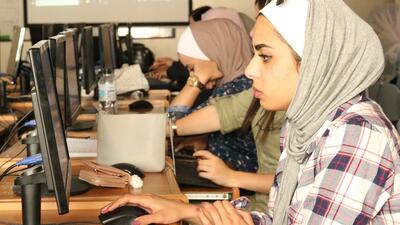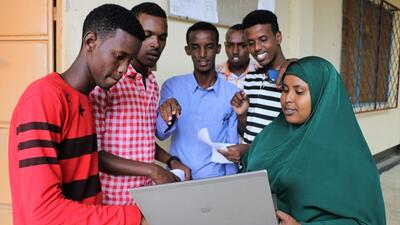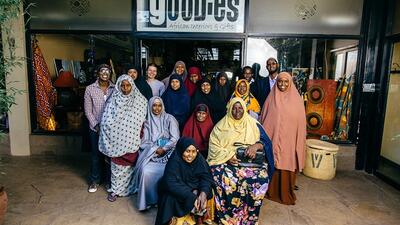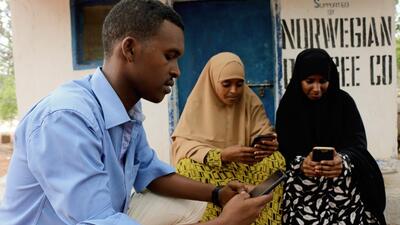Story: From “hustling” to earning money online
Last week was a happy week for Martha Ali and her follow students in the Kakuma refugee camp in Kenya when they graduated from the digital marketing training the Refugee Employment and Skills Initiative (RESI) delivered.
Established in 1992, the Kakuma refugee camp is among the oldest and largest in the world. As such, its inhabitants live in a protracted state of uncertainty, having limited opportunity to work to sustain their livelihoods and build a safe future.
Ever since she arrived in the camp, Martha struggled to make ends meet and was doing casual jobs to provide for her children.
’As refugees, we have no opportunities for jobs, and even if you get one, they don't pay much,’ she says.
She continues: ’I arrived in this camp in 2016 and since that time, I did one job after another to fulfil my daily budget. It was never enough. I tried being an entrepreneur but failed as I lacked capital. By now I have two kids and have continued to hustle from job to job with no evident success. You find yourself tired with nothing in your pocket. Last year, I came across an advert from the Norwegian Refugee Council for freelancing, so I decided to apply – and fortunately, I was selected to join.’
The International Trade Centre’s delivers the Refugee Employment and Skills Initiative in Kakuma in partnership with the Norwegian Refugee Council, supporting youth from the refugee and host community in developing skills in digital marketing and gaining jobs as online freelancers.
The training includes courses in English, digital marketing and digital entrepreneurship, helping people like Martha develop competitive skills for online jobs.
A tailored programme for marketable skills
The digital marketing course teaches subjects like content creation, graphic design, social media marketing, and search engine optimization. An important part of the training is the practical component that allows participants to apply what they are learning to in-class projects, using an approach that identifies and addresses students’ different strengths and areas of need.
‘We needed to integrate more activities since digital work is more hands on and less theory. I developed practical tests with 15 activities per week. These helped me in identifying high performers and average students. All average performers were integrated into a group with the high performers to foster skill inheritance and alienate any weaknesses,’ says course trainer Richard Omulure Ombina.
‘I believe each student has unique abilities and talents, and my approach focuses on developing and nurturing them,’ he says.
Following this, students attended a training on digital entrepreneurship exploring becoming a micro entrepreneur on online work platforms like Upwork or Freelancer.com, using the skills they acquired in digital marketing.
The International Trade Centre has designed this programme uniquely for contexts of displacement characterized by a high level of uncertainty. As such, it focuses on developing portable skills so that participants such as Martha can secure their salaries from inside the refugee camp, as well as beyond its borders should they have to move again.
‘I have gained new skills and confidence,’ says Martha. ‘This will help me get more jobs and earn money, which on the other hand will help me raise my family in a comfortable manner. At least, we will not starve if one day the camp will close. I know I can be able to live anywhere knowing I have skills to earn money.’
Along with the this particular training on technical skills, the Refugee Employment and Skills Initiative has been offering a mentorship programme to help students develop life skills that are essential when working in online freelancing. The mentorship programme will continue to support the graduates in getting their first jobs and kick starting their careers online.










